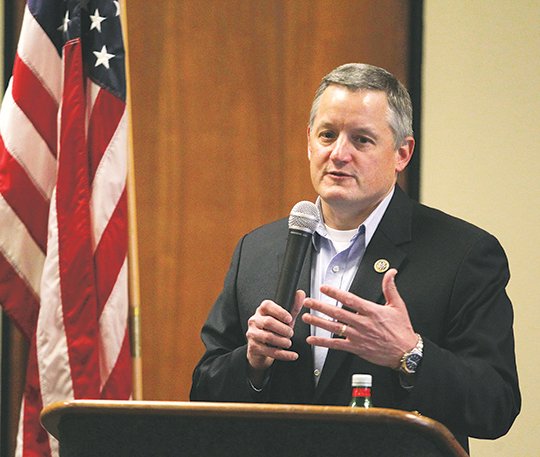U.S. Rep. Bruce Westerman, R-District 4, said Monday that constituent reaction to his vote against the bipartisan budget agreement last week has been positive.
Westerman was the only member of Arkansas' all-Republican congressional delegation to vote against the agreement, which adds an estimated $320 billion in spending over the next two years while also cutting a number of taxes.
"The reaction I've had has been all positive," Westerman said in an interview following a Coffee With Your Congressman event in Hot Springs on Monday.
"People appreciate me voting as a fiscal conservative, and I think they understand the conundrum that I'm in, being supportive of the military, and understanding disaster relief is important, and it's not like I haven't voted for those two things in the past. But when you put it all together and are creating these large deficits without the offsets in spending, that's just somewhere I couldn't go."
The national debt surpassed $20 trillion last year. The budget deficit for fiscal 2017 totaled $666 billion. Passage of a 10-year, $1.5 trillion tax cut package in December is expected to widen the gap between government revenue and expenditures, says the Congressional Budget Office, according to an article about the vote on the budget agreement in Saturday's edition of the Arkansas Democrat-Gazette.
"One of the things that inspired me to run for Congress in the first place was the enormous debt that we're racking up and the deficit spending, which every year that we have a deficit, that just adds to the debt," Westerman said Monday.
"The way I see it is, deficit spending and debt is a tax on future generations, because the only way you pay for public debt is through taxes, and instead of us paying for it now, we're forcing that on future generations, and I want my kids and grandkids to have opportunities in this country without a huge amount of debt hung around their neck," Westerman said.
Westerman, noting that security is constitutionally the No. 1 priority of the federal government, said he voted for a defense appropriation bill along with 11 other appropriation bills back in September, which passed long before the first shutdown.
"But, unfortunately, when it gets to the Senate, it's gone nowhere, and last week was the day of reckoning on that, and to get the 60 votes they needed in the Senate to pass the defense appropriation bill along with some emergency disaster funding for the hurricanes, they ended up adjusting the budget caps, adding in a whole lot of non-defense discretionary spending. At the end of the day, the bill came back to the House with over $300 billion of discretionary spending just in the next two years," Westerman said.
"It will put the deficit spending at a trillion dollars this year and next year going down that route, and I just couldn't vote for that increased deficit spending," he said.
Westerman noted that House votes are "always binary, it's either yes or no."
"There was stuff in the bill that I liked; stuff in the bill I didn't like, so it wasn't like I vote one way and feel good about it; it's feeling less bad about it and voting the other way, so it's really the kind of votes that I despise us getting ourselves into in Congress. I wish we could look at one issue at a time, and vote up or down on individual issues," he said.
Westerman, commenting on the release of President Donald Trump's infrastructure proposal on Monday, said he had not seen a detailed copy of what the president had proposed, but had two concerns up front.
"The main concerns I have about it right now are, No. 1, how do you pay for it? And I haven't seen what he's released, but I know he's talking about a lot of public-private partnerships, getting private money invested in the infrastructure, which is good and works in some instances, but probably not very much in Arkansas or the rest of rural America," Westerman said.
"The bottom line is, to do $1.5 trillion of infrastructure over 10 years, $150 billion a year, the money's just not there right now."
Westerman said his second concern is, with the passage of the tax cuts, "we're seeing a lot of economic growth in the private sector, and a lot of investments in projects being announced ... if we throw a massive public infrastructure package out there at the same time, I'm worried we might slow some of the growth in the private sector because of the competition for labor."
Local on 02/13/2018